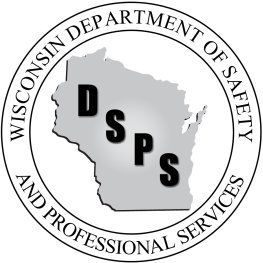COVID-19 Response, Plan Review Process Improvements, PDMP Accolades Among Year-End Highlights for Department of Safety and Professional Services
MADISON, Wis. – Despite the challenges that 2020 presented, the Department of Safety and Professional Services concludes a second successful year under the leadership of Secretary-designee Dawn Crim. For most of the year, DSPS supported the state’s pandemic response while maintaining services and improving certain operations. The agency served a critical role in preparing the health care system for the unique demands of COVID-19 and took important steps to keep the construction industry on track and state credential holders at work.
“Our people have been working hard all year, and I am incredibly proud of what our staff was able to accomplish under these unusual and unusually trying circumstances,” Crim said. “Their adaptability, flexibility, and resilience enabled us to contribute to the pandemic response and maintain nearly all of our services throughout the pandemic while also keeping several important process-improvement projects moving.”
The department also quickly established new processes for handling temporary license applications for health care professionals licensed in other states. The department issued more than 1,200 temporary licenses, supporting state efforts to quickly augment the health care workforce in anticipation of increased demand when COVID cases surged. The department also waived late fees and implemented emergency renewals for health professionals whose licenses had expired within the past five years.
To keep the construction industry on track, DSPS developed a video inspection protocol to minimize in-person contact between customers and staff. The department also enhanced tutorials to help more customers transition to electronic filings, again to minimize interactions between employees and the public. Also, the department worked closely with regulatory boards to extend deadlines when required continuing education programming was cancelled at the last minute, putting some license holders in jeopardy of not meeting renewal requirements.
“We were very focused on workforce needs,” Crim said. “We knew the health care system would need flexibility to quickly add staff and to move their providers to areas of greatest need. We knew we needed to be innovative and flexible to keep construction moving without compromising safety. And we knew we needed to do what we could to keep our credential holders in good standing so they could remain in the workforce.
The department’s mission includes protecting health and safety while supporting the economy. The pandemic brought that into sharp focus.”
The department also communicated with customers to share important administration and department information about COVID-19 efforts and impacts. These communications included news about emergency orders, links to forms for temporary license applications, guidance issued by other departments and governmental bodies, and more.
In addition to critical COVID-19 response efforts, DSPS also maintained the vast majority of its functions throughout the pandemic. The department also recorded a number of successes despite the added demands and unusual working conditions. These include the following:
- The department shortened plan review wait times to under six weeks for all plan types, while 2020 plan volume increased 25% over 2019 plan volume, after thoroughly redesigning the process to improve customer service and better leverage staff expertise and resources while maintaining safety.
- Secretary Crim signed an agreement allowing reciprocity between auctioneers licensed in Wisconsin and Ohio. This is the first reciprocity agreement for auctioneers in twenty years, and Ohio becomes the seventh state where Wisconsin auctioneers can become licensed with a vastly simplified process, shorter timeline, and reduced cost.
- Secretary Crim convened the Commercial Building Code Council and the Plumbing Code Advisory Committee to work on updating relevant building codes. Updated codes facilitate the use of more innovative designs as well as more sustainable materials and practices.
- The department supported the Controlled Substances Board’s annual law enforcement hearing, which brings in members from the law enforcement community to share observations and knowledge of drug activity with the CSB.
- Secretary Crim met with several industry stakeholders to learn more about current efforts to increase diversity in various fields. She also participated in public discussions on how to develop leadership skills in underrepresented groups and how to build more inclusive workplaces.
- The Enhanced Prescription Drug Monitoring Program (ePDMP), which is part of the Evers’ Administration’s effort to change opioid prescribing and reduce opioid dependence, won several awards and received a United States Department of Justice grant worth nearly $2 million. The Wisconsin ePDMP routinely receives accolades for its user-centered design and sophisticated data visualizations that enable health care leaders, drug enforcement professionals, and policy makers to see changes in prescribing practices at the county level.
- The department continued its technology modernization efforts that will merge multiple systems, automate more functions, and increase adoption of paperless operations.
- The department updated onboarding processes and launched a new intranet, both of which proved invaluable when the pandemic forced employees to work remotely.
- The demand for careers in licensed occupations continues to grow, as the department processed 1,146,193 applications as of December 7, up from 1,104,109 in all of 2019.
Secretary Crim says 2021 will include ongoing support of the state’s COVID response, including any actions necessary to expedite vaccination and ongoing work to limit the spread of disease. The agency will also continue with technology updates, including rolling out new submission platforms for customers in the construction industry early in the spring.
The Department of Safety and Professional Services issues more than 240 unique licenses, administers dozens of boards and councils that regulate professions, enforces state building codes, runs the state fire prevention program, and maintains the award-winning Wisconsin Enhanced Prescription Drug Monitoring Program, which is a key tool in the multi-faceted public health campaign to stem excessive opioid prescribing. A fee-based agency, the Department of Safety and Professional Services is self-sustaining and receives no general fund tax dollars for its day-to-day operations. With five offices and 250 employees throughout Wisconsin, DSPS collaborates with constituents and stakeholders across a wide range of industries to promote safety and advance the economy.
NOTE: This press release was submitted to Urban Milwaukee and was not written by an Urban Milwaukee writer. While it is believed to be reliable, Urban Milwaukee does not guarantee its accuracy or completeness.
Recent Press Releases by Wisconsin Department of Safety and Professional Services
Latest Round of DSPS Youth Firefighter Training Grants Opening
Feb 2nd, 2026 by Wisconsin Department of Safety and Professional ServicesWisconsin's safety agency continues investment in future of state fire departments
Wisconsin DSPS Recognized for Innovation
Nov 26th, 2025 by Wisconsin Department of Safety and Professional ServicesAgency's digital license offering earns prestigious award




















